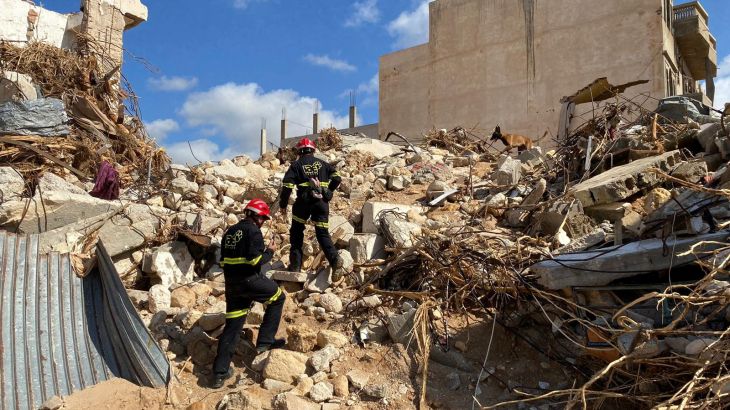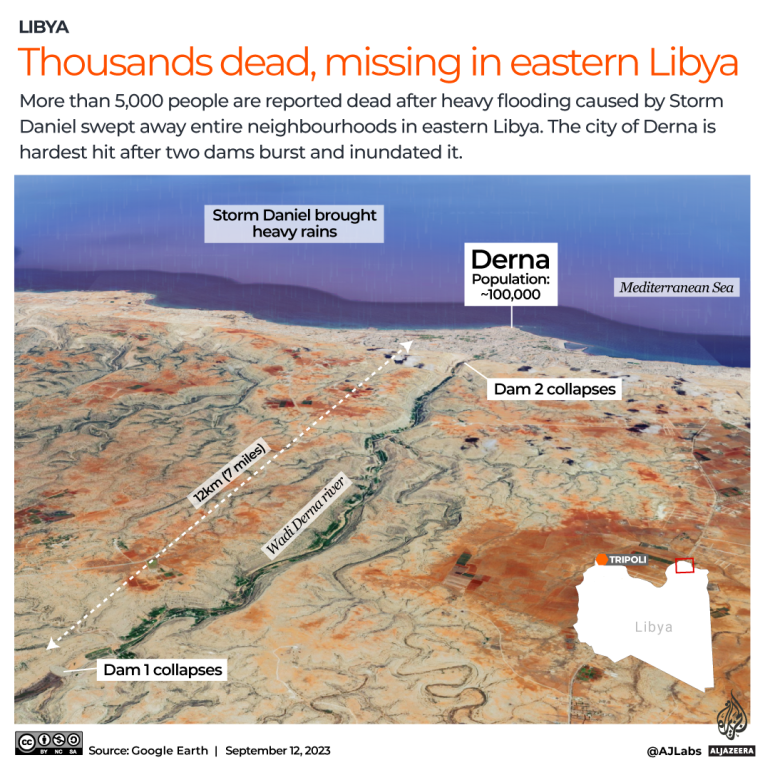‘Disaster of epic proportions’: Libya prosecutor probes deadly dam collapse
Prosecutors will investigate local authorities, previous governments and allocation of the dams’ maintenance funds.

Libya’s top prosecutor will investigate the collapse of two dams in the eastern port of Derna that launched a fast-moving wall of water that killed thousands of people and largely destroyed the city.
General Prosecutor al-Sediq al-Sour told reporters that local authorities, previous governments, and the allocation of the dams’ maintenance funds will be scrutinised.
Keep reading
list of 4 itemsNatural disaster or man-made, why was Libya so vulnerable to floods?
Flooding death toll soars to 11,300 in Libya’s coastal city of Derna
‘Desert turned into a sea’: Eastern Libya flood survivors recount horror
“I reassure citizens that whoever made mistakes or negligence, prosecutors will certainly take firm measures, file a criminal case against him and send him to trial,” al-Sour said at a news conference late on Friday.
The investigation was announced as rescue teams continued to search for bodies in the ravaged city on Saturday, nearly a week after Storm Daniel’s impact on the dams that one aid official said killed more than 11,000 people.
Conflicting death tolls have been reported with officials in the east and west of the divided country giving different estimates.
The World Health Organization (WHO) said on Saturday “the bodies of 3,958 people have been recovered and identified” with 9,000 more still missing. It also announced 29 tonnes of health supplies arrived in the eastern Libyan city of Benghazi.
“This is a disaster of epic proportions,” said Ahmed Zouiten, the WHO’s representative in Libya. “We are saddened by the unspeakable loss of thousands of souls.”
‘City smells like death’
Aid organisations have warned the coming days could see the spread of disease as well as grave difficulties in delivering supplies to those in need.
Islamic Relief warned of a “second humanitarian crisis” after the Derna disaster, pointing to the “growing risk of water-borne diseases and shortages of food, shelter and medicine”.
“Thousands of people don’t have anywhere to sleep and don’t have food,” said senior official Salah Aboulgasem. “The city smells like death. Almost everyone has lost someone they know.”
Haider al-Saeih, head of Libya’s centre for combatting disease, said in televised comments on Saturday at least 150 people suffered from diarrhoea after drinking contaminated water in Derna. He urged residents to only drink bottled water, which is being shipped in as part of relief efforts.
Caroline Holt, director of disasters, climate and crises with the International Federation of Red Cross and Red Crescent Societies, noted while aid had started to arrive issues such as unexploded landmines posed a threat to delivery.
“Getting that aid of course from the airport to Derna itself provides an additional level of challenge. We know that roadways have been greatly impacted by this,” Holt told Al Jazeera.
“We know there will be security issues … Those landmines that may once upon a time had been mapped clearly, now all of that will be disturbed. It adds an extra level of security risks to both the population in Derna and those coming in from the outside.”
Critical neglect
It is unclear how an investigation by prosecutors will be carried out as Libya has been split between two rival administrations following the NATO-backed uprising that toppled Muammar Gaddafi in 2011.
The two governments are backed by different militias and international actors. The lack of a strong central government has resulted in the neglect of crucial infrastructure.
A report by a state-run audit agency in 2021 said the two dams, which were built in the 1970s, had not been maintained despite the allocation of more than $2m for that purpose in 2012 and 2013.
In 2007, a Turkish firm, Arsel Construction Company Limited, was contracted to carry out maintenance and build another dam in between. According to the firm’s website, it completed that work in November 2012.
Al-Sour urged residents who have missing relatives to report to a forensic committee that works on documenting and identifying retrieved bodies.
“We ask citizens to cooperate and quickly proceed to the committee’s headquarters so that we can finish the work as quickly as possible,” he said.
Questions have been raised about whether the high number of casualties in Derna could have been avoided with better governance.
‘Human reaction response’
Stephanie Williams, a US diplomat and former UN envoy to Libya, urged global mobilisation to coordinate aid efforts in the wake of the flood in a social media post.
She warned of the “predilection of Libya’s predatory ruling class to use the pretext of ‘sovereignty’ and ‘national ownership’ to steer such a process on their own and in a self-interested manner”.
Holt said it is time for rival factions to “put aside political differences” and noted there are signs of that happening on the ground already.
“We are hearing very heartening stories of east and west coming together – people literally coming in from the west to try and support. It’s a very human reaction response,” she said.
